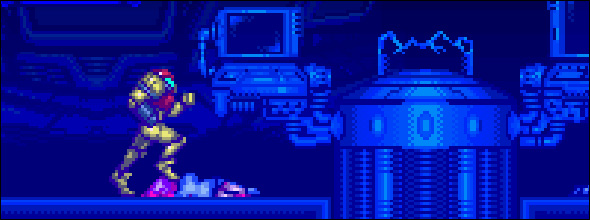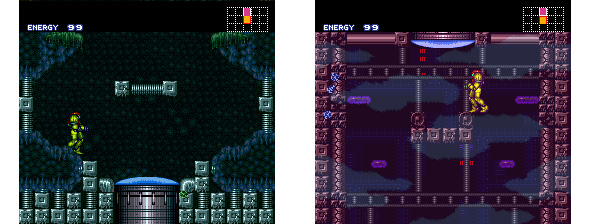Super Metroid – Open-ended Linearity
August 31st, 2010
The original Metroid has a defining flaw that would later be rectified with its successor, Super Metroid. The open-ended environments are a composition of arbitrarily posted tile sets with little sense of direction. To put it frankly, the desolate planet Zebes is a maze. As a result, there’s a certain sense of dread you often feel when playing Metroid, as it’s very easy to lead yourself astray in the oxygen-less solitude and find yourself boxed in against an insurmountable tangle of similarly-looking tiles. Super Metroid avoids the confusion by providing sufficient scaffolding to lead players along without arousing their suspicion that the experience Super Metroid offers is a well managed, staged affair. In this way, it fools the player into discovering things for themselves, when in fact our exploration is preordained, and we love it all the more for it.
Let’s take a squiz at how exactly Super Metroid appears more open-ended than it actually is. Super Metroid utilizes the SR388 overworld as a hub which connects the player to the various planetary sub-sections. Overworlds are often interpreted as de-linearating a game and offering player choice, even though oftentimes they afford no such freedoms.Super Metroid‘s overworld is a guise. Players are free to search for and enter SR388’s separate domains before the game requires them to, but on stumbling upon Brinstar, Norfair or Maridia the player quickly realizes that their progress is limited by their current selection of power-ups. In this sense, the player’s sphere of progression is not tied to the seemingly open world, but to the power suit. Therefore, the limitations enforced upon the player are not presented in a way which can be translated into tangible areas of the map, by which, the player cannot properly understand what is or isn’t within their reach. The only way that they can find out is by looking for themselves. Not only does this unknown (but never hidden) factor liberate the player’s sense of exploration, but it also persuades them to gain their own bearings of the world through actual exploration. The map is therefore a clever aid in the exploration process, since it does provide that tangible reinforcement to the player.
The individual chunks of terrain that break away to your power-ups are doorways masked as environmental puzzles, where the power-ups themselves are switches that activate the opening of doors. When a player acquires a new power-up in Super Metroid, several gates are open. Of course, Super Metroid is still linear since the gates that lead to to the next major power-up (and so on until the end of the game) are pre-determined; all players will walk the same rough path. However, Super Metroid hides this very fact in three ways. Firstly, the player may take their own route to the next mandatory gateway. Secondly, when a power-up is gained, it opens the potential for the player to access peripheral weapon upgrades (which increases the number of items held), think of them as secondary doors. And lastly, on occasion, there is more than one mandatory gateway that leads the player to the next power-up; since there is some choice, this is thereby not linear. As you can see, it’s all effectively linear, but it’s mapped around a system of diversion. No first time player will stumble upon the perfect combination of clues to lead them linearly to the end of the game. Players will inevitably be de-routed, and on their way, stumble into weapon upgrades, dead ends, previously explored areas, and walk in circles; all are tricks to create a false sense of freedom.
So, the real meat of Super Metroid are the power-ups and respective gateways which forward the progression to the end game. These are directive tools which manipulate the player’s progression. And as can be seen, Metroid is highly managed, yet we love Metroid so much because the game tricks us into thinking that we are exploring by ourselves; however, we are exploring within the confines of a mold which is ultimately linear and intentional.





 Game Design Companion: A Critical Analysis of Wario Land 4 - $7.99
Game Design Companion: A Critical Analysis of Wario Land 4 - $7.99 Level Design: Processes and Experiences
Level Design: Processes and Experiences Speed Boost: The Hidden Secrets Behind Arcade Racing Design - $5.99
Speed Boost: The Hidden Secrets Behind Arcade Racing Design - $5.99 Adventures in Games Analysis: Volume I - $5.99
Adventures in Games Analysis: Volume I - $5.99







